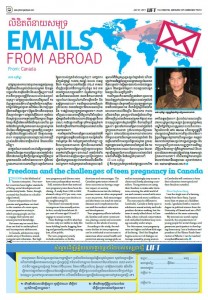 FREEDOM is the lifeblood of human enterprise. Free-market countries have higher standards of living, social development and productivity levels. Some, though, contend that freedom is a double-edged sword.
FREEDOM is the lifeblood of human enterprise. Free-market countries have higher standards of living, social development and productivity levels. Some, though, contend that freedom is a double-edged sword.
Greater independence from parents and guardians can lead to the creation of a more open, more progressive society in which young people are free to engage their talents and amass practical knowledge.
But some say too much freedom can lead to undisciplined and incompetent adolescents.
In Canada, adolescents enjoy a wide array of freedoms, sexual, romantic and otherwise. But high teen pregnancy and divorce rates have some policymakers worried.
Still, statistics show that national teen pregnancy rates have been declining. A study from 1996 to 2006 showed a drop of 37 per cent, compared with a 25 per cent decline in the neighbouring US.
This doesn’t necessarily mean teenagers are less sexually active. In fact, a study found about 50 per cent of teens aged 16 and 17 engage in sexual activity.
These findings confirm what has become only too visible in daily life: teens holding hands, hugging, kissing and generally revelling in young love, all in public.
The teen-pregnancy study includes statistics on births, abortions and miscarriages. The Canadian government views all three outcomes as having a negative impact on society.
Continue reading
